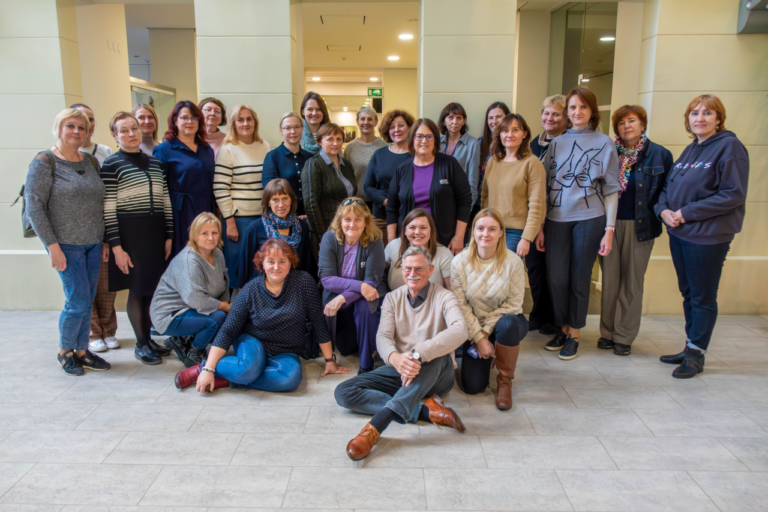Storytelling helps libraries to create a connection with local communities, and educational activities based on storytelling involve, open imagination, create a safe space for self-expression, allow ones to get to know literature and the world, to know themselves better and encourage learning. On the 17–18th of October the international practical conference “The Power of Story, Inspiring Voice: Involving Educators in Digital Storytelling” held at Panevėžys County Gabriele Petkevičaitė-Bite Public Library helped its participants to explore the specifics of traditional storytelling even more deeply and let immerse themselves in the new environment of digital storytelling.
In 2021, due to the initiative of Panevėžys County Gabrielė Petkevičaitė-Bitė Public Library, the revival of the art of storytelling started in libraries – a network of storytelling libraries was created, which was joined by 24 libraries of the Panevėžys region with a community of 40 librarians-storytellers, and 5 new educational programs were created for children, youth and adults. All this was achieved with the Swedish and Norwegian partners during the implementation of the project “Creating a model of storytelling art and method for Lithuanian libraries”.
Delving into traditional storytelling forms and learning new ones
The relevance of storytelling educational lessons and the need for continuous improvement, the desire to learn from professionals encouraged the need of the community of librarians-storytellers to further delve into this art. In 2023 Panevėžys County Gabrielė Petkevičaitė-Bitė Public Library received the support of the Baltic-American Freedom Foundation and on the 17–18th of October the international practical conference “The Power of Story to Inspire Voice: Engaging Educators in Digital Storytelling” was held in the library. During the event, training in traditional storytelling took place as well. It was supported by Erasmus+ program in the frame of which Panevėžys County Gabrielė Petkevičaitė-Bitė Public Library in 2021–2027 implements accreditation project in the field of adult education. 40 librarians of Panevėžys region participated in the creative workshops of the conference.
This event aimed to familiarize the librarians of Panevėžys region with the methodology of another professional storyteller, a representative of traditional storytelling, to improve the art of storytelling, and to discover new resources for activities with various groups of library visitors. Another goal of this event was to familiarize educators with the specifics of digital storytelling, to try out all the steps of creating a story using digital tools in a creative workshop with digital storytelling experts from the USA.
Learning from experts
In the creative workshops, the librarians gained experience from excellent experts. The traditional storytelling workshop was led by Richard Martin, a professional storyteller from Germany with over 30 years of experience, a participant of many international festivals. The participants of his creative classes are librarians, pedagogues, educators, schoolchildren. While working as an English and German language teacher, R. Martin has developed a methodology for successfully using narrative elements in language teaching. During the COVID-19 pandemic, the lecturer was one of three professional storytellers who created the freely available electronic platform “Storyflix” – a free catalog of folk tales, myths and legends, which contains videos of performances by professional storytellers from different countries.
During the creative workshop of traditional storytelling, the participants could watch the performances of a professional storyteller, and then together with the lecturer, discuss the meaning of each element important for story telling – voice, mimics, body language, gestures. During the classes, enough time was devoted to practical tasks, when the participants applied the learned methodology and looked for their own means to tell stories as convincingly as possible.
Digital storytelling training was conducted by lecturers with many years of practical experience from the USA, Gwynn Moore and Julie Jaeger, who are leaders of the International Society for Technology in Education (ISTE), educational media technology pedagogues, experts in creative digital storytelling. The lecturers are permanent speakers and educators at the annual international practical conference ISTELive held in the USA. This event promotes the creation of innovative learning environments using modern technologies.
During the interactive learning process, the participants of the digital storytelling creative workshop heard what aspects of society’s life are important for the emergence of historical, personal, religious, educational stories; learned about the purpose of the story; became familiar with the basic steps, elements and methods of digital storytelling; learned how to engage their audience in digital storytelling; chose the most suitable tools for creating a story and mastered them by performing practical tasks. In the final session of the creative workshop, the participants discussed and tested possible formats of digital storytelling with lecturers.
Happy with continued traditions and discovered new methods
After the workshops of traditional storytelling, the participants were happy to get a lot of useful ideas and hear great stories told by the storyteller Richard Martin, which they will use in their work with groups of children, youth and adults.
According to the librarians, there was enough of everything during the training – the narrator’s own performances, practical tasks, direct communication, and reflection. The training allowed the librarians to get acquainted with the methodology of another professional storyteller, to remember how important body language, eye contact, gestures, mimics, and voice modulation are when telling stories.
The participants received useful tips on how to relate the story being told to the environment and the library’s collections, how to involve the audience in the story.
“As a representative of traditional storytelling, I feel a personal responsibility for this art form. Most of the stories have thousands of years of tradition, so I think it is very important to continue these traditions and share the stories with other people. When I came to Lithuania and met the audience of librarians, I realized how important it is for them to preserve the tradition of oral storytelling and their culture in general. During the classes, I felt the participants’ great interest and desire to tell the stories they heard to their audiences – children, youth, and adults. I am very happy that these sessions became a strong impulse to continue storytelling educational activities in libraries and I hope that my advice will help to do it even more successfully and with even more pleasure”, – lecturer Richard Martin shared his impressions after the event.
After the digital storytelling sessions, their participants were happy that they learned to animate and present stories in a completely different, innovative form. The librarians’ plans include applying tested digital tools in creating book trailers, new format educational activities for various audiences, preparing for events, and implementing the library’s communication plans. The participants of the sessions were eager to share their practical experience with their colleagues and emphasized that digital storytelling is definitely for libraries.
“The digital storytelling method makes it possible to turn boring things into innovative and attractive ones for today’s society. Even when living in different countries, storytellers can use technology to create and edit the same story. I was very happy to see so many adult people, not afraid of challenges and willing to learn new things. All participants engaged in a learning process to acquire digital storytelling competencies and will now apply these skills to create new services for library patrons and share their knowledge with colleagues. I am happy with the results achieved and I have no doubt that each participant will create truly extraordinary stories”, – lecturer Julie Jaeger shared her experience.
“Seeing how the participants were able to take our knowledge and put it into practice in a few days was a real gift. Although we speak different languages, it was not difficult for us to understand each other, because we have many things in common. To all those who tell stories, I want to remind you that the power lies precisely in your story, and digital tools only give the story different forms”, – lecturer Gwynn Moore continued her colleague’s thoughts.
Lecturers Julie Jaeger and Gwynn Moore will present this successful experience of cooperation with Lithuanian libraries at the international practical conference ISTELive 2024, which will be held in Denver (USA) next June.
The art of storytelling is like an inexhaustible source and every storyteller as a performer and pedagogue is unique, so in the future the participants of the workshops would be happy to improve their knowledge in the field of both traditional and digital storytelling.
This program is made possible by funding from the Erasmus+ program and Baltic-American Freedom Foundation (BAFF).
Prepared by Virginija Švedienė, Coordinator of Adult Education Activities and Toma Apynytė-Kirslienė, Head of the Department of Cultural Education for Children and Youth
Event was funded by

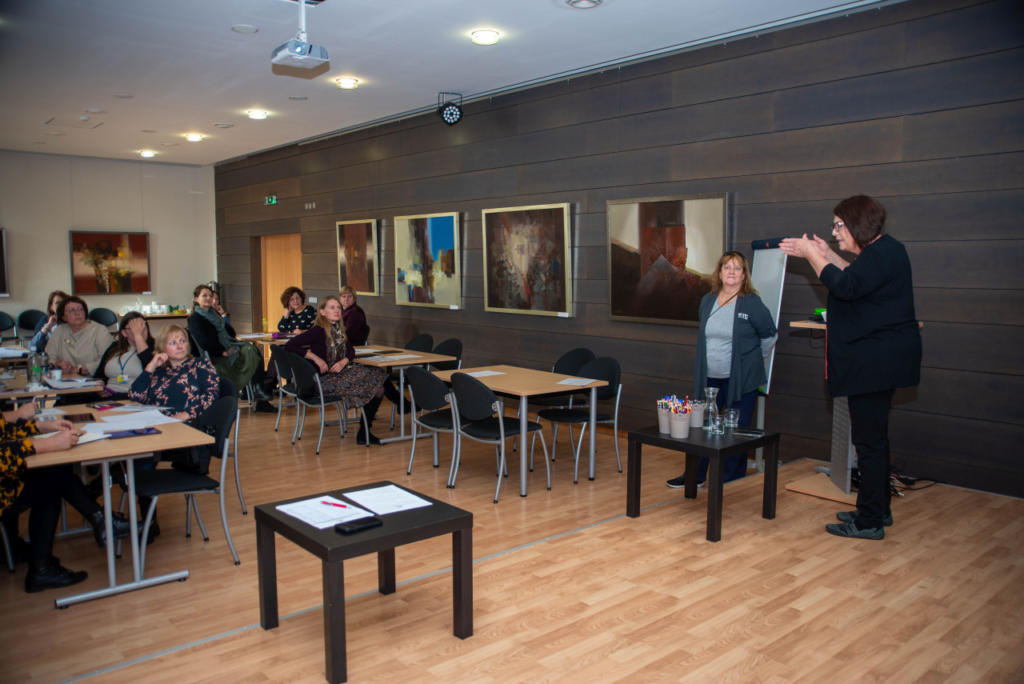
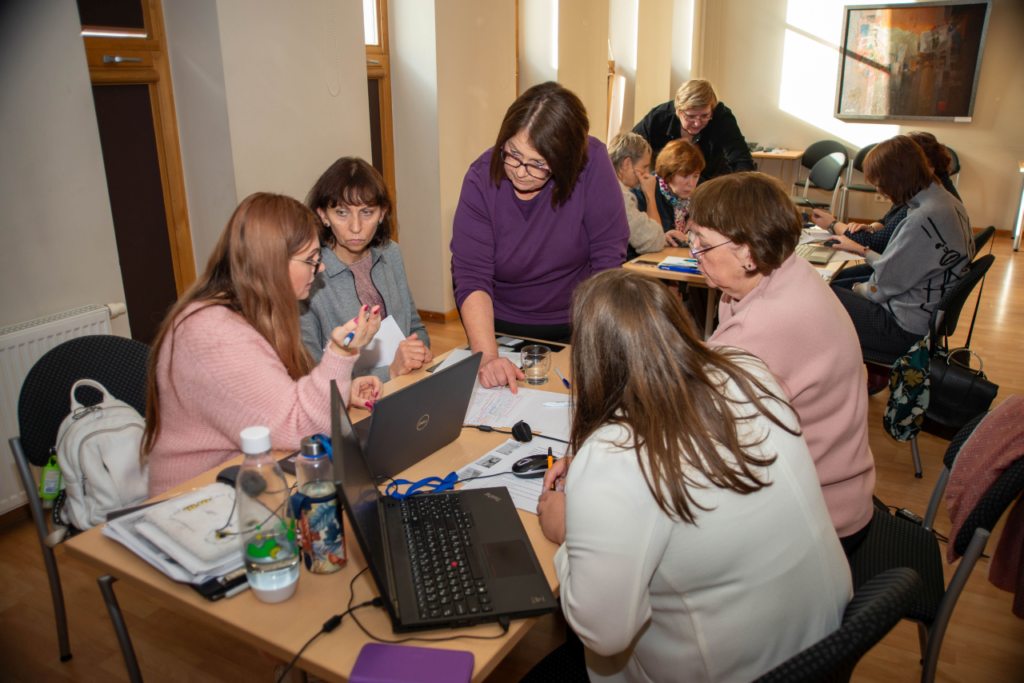
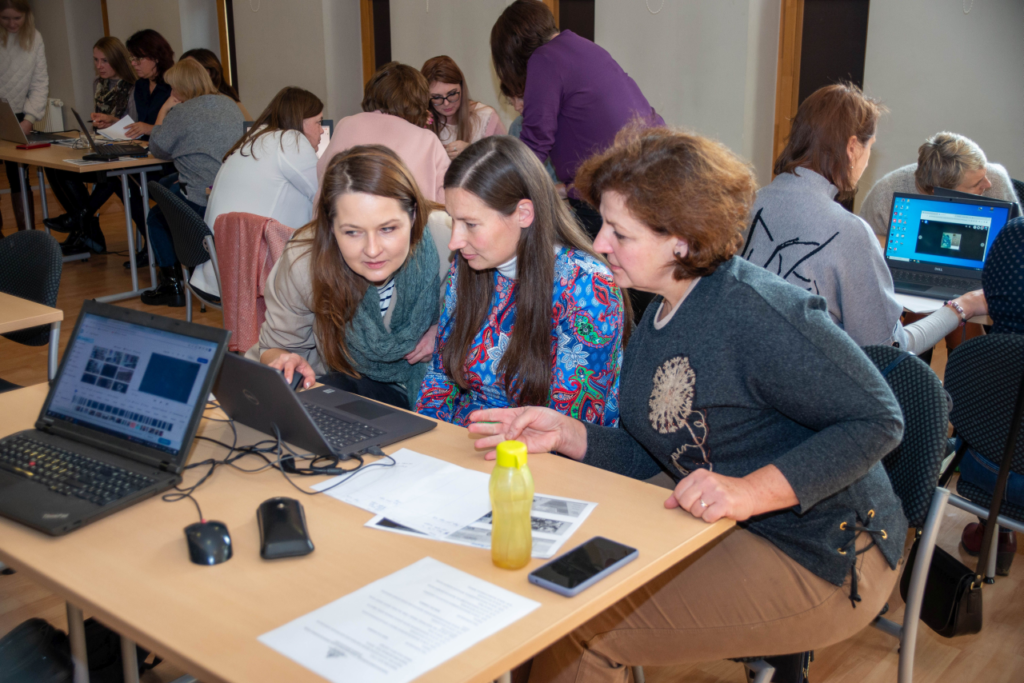
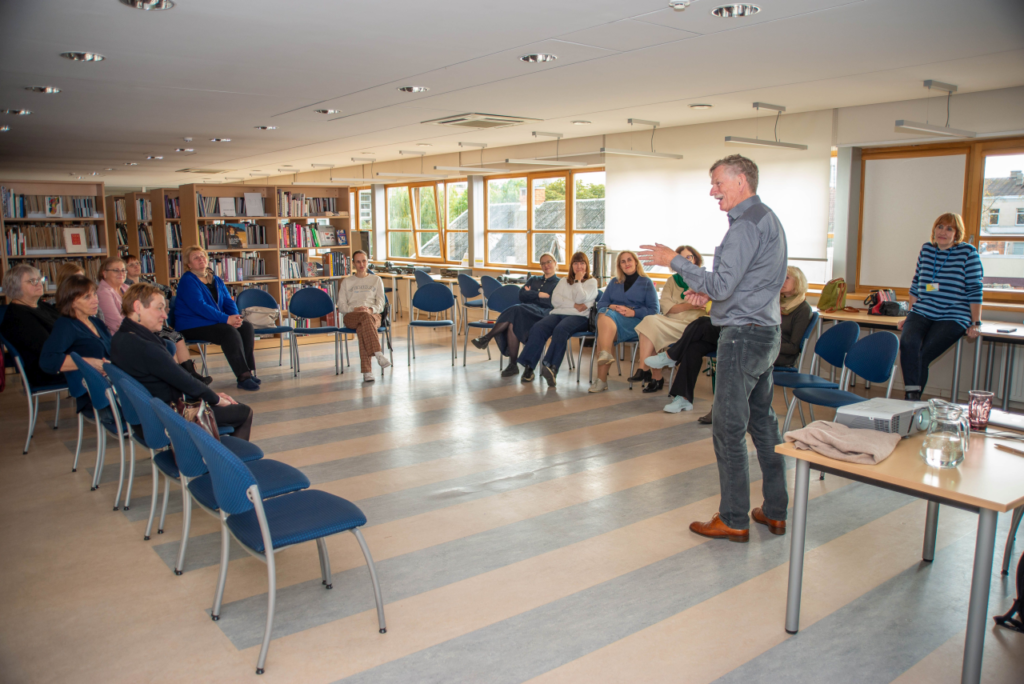
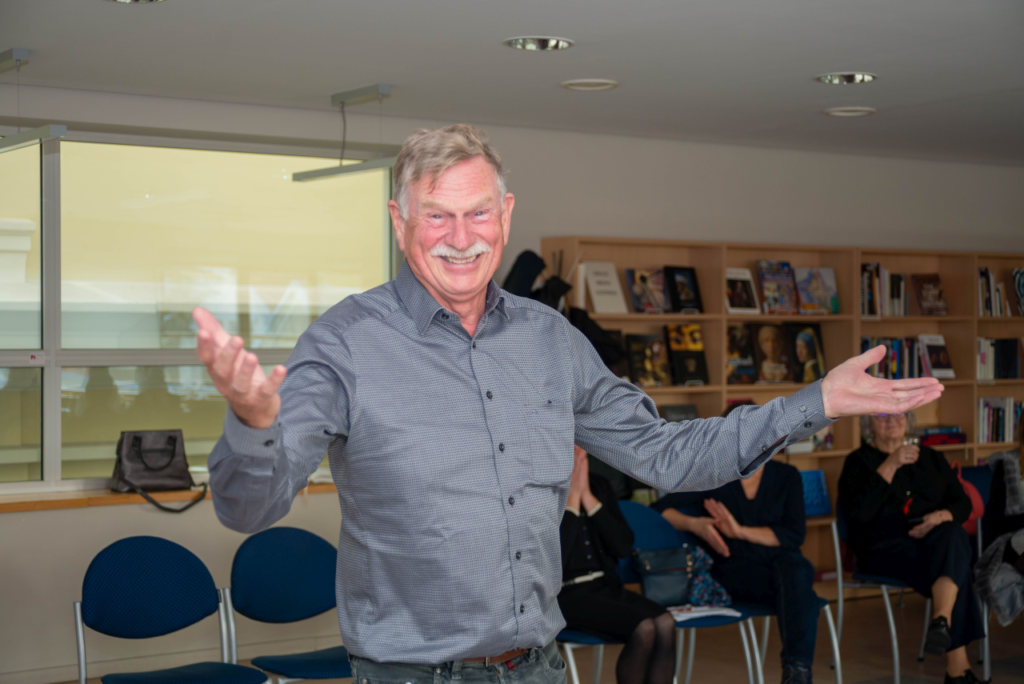
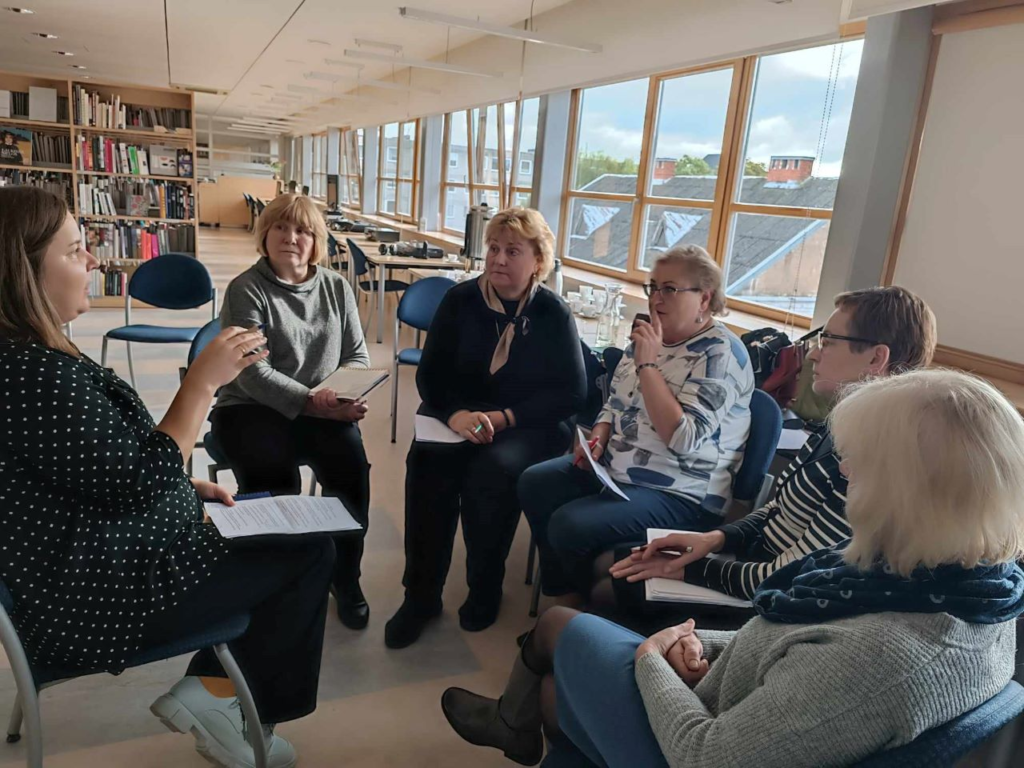
Informuojame, kad renginių metu visuomenės informavimo tikslu gali būti fotografuojama ir filmuojama, todėl Jūs galite būti matomi nuotraukose ir vaizdo įrašuose. Renginių nuotraukos ir vaizdo įrašai gali būti skelbiami renginio organizatorių interneto svetainėse ir socialinių tinklų paskyrose bei platinami įvairiose žiniasklaidos priemonėse.

